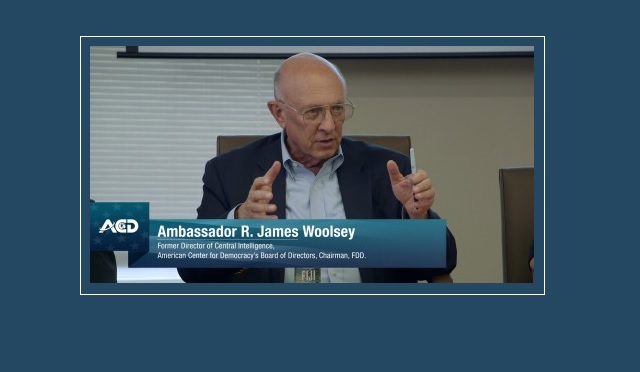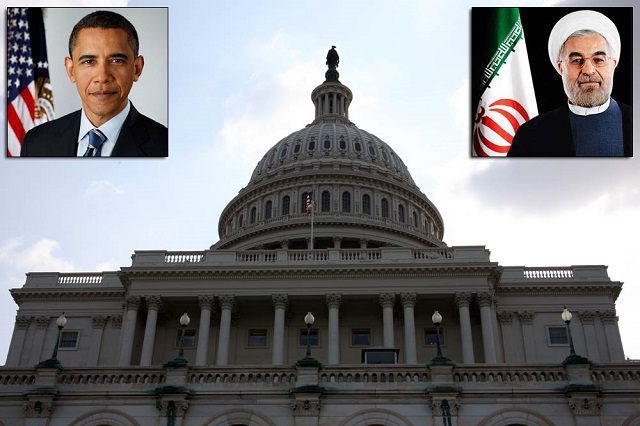PODCAST: Iran Nuclear Deal ‘worthless’ with ‘theocratic, totalitarian, genocidal imperialists’
It was a fast paced discussion on the August 2, 2015 Lisa Benson Show on National Security with guest, former CIA director, Ambassador R. James Woolsey. Ambassador Woolsey is Chairman of the Board of Directors of the Washington, D.C.-based Foundation for the Defense of Democracies. See his full bio, here. Host Lisa Benson was joined by Michael Weiser, foreign policy analyst and this writer.
The discussion addressed threats not currently covered by the media arising from the Iran nuclear pact announced on July 14th and unanimously endorsed on the University Security Council on July 22nd. Ambassador Woolsey called pending Iran pact “ a worse than useless agreement “ and deemed the Iranian Islamic regime, “theocratic, totalitarian, genocidal , imperialists”. He contends that Iran may be less than a few months away from developing a nuclear weapons but less than the year the Administration believes would be delayed by a decade. When asked about what options Congress to prevent implementation of the Joint Comprehensive Plan of Action (JCPOA), he suggested that an informed public has to get behind an effective campaign to get the message across to Congress to overwhelmingly reject it
Among the important issues discussed in the Lisa Benson Show with Ambassador Woolsey were:
- The Electronic Magnetic Pulse threat posed by Iran with a nuclear equipment missile to the US;
- What is required to protect the country’s vital electrical grid under the provisions of the Critical Infrastructure Protection Act of 2015 (CIPA);
- The Administration gutting Ballistic Missile Defense against an Iranian Missile Attack;
- What constitutes a better deal, without a military option; and,
- How a Flexible Fuel strategy could upend the OPEC Cartel, especially Russia, Venezuela and Iran.
The controversial Joint Comprehensive Plan of Action (JCPOA) has been the subject of Hearing with Administration witnesses before both Senate and House Foreign Relations and Armed Services Committees before last Thursday summer recess. Disquieting information was revealed in those regarding secret side deals between the UN Watchdog, the International Atomic Energy Agency (IAEA) and Iran, lifting of $150 billion in sanctioned funds $150 billion in sanctions relief ,retention of key parts of the nuclear infrastructure, 24 day prior notice inspections of known facilities, obligations to protect Iranian nuclear facilities against sabotage, and lifting of conventional arms and ballistic missile sanctions. One of the disturbing revelations in Congressional hearings on the Iran nuclear pact was the lifting of sanctions on 800 persons and institutions in Iran that included Quds Force commander Qasem Soleimani who is responsible for more than 500 deaths and hundreds casualties of American Service personnel in the Iraq War from Iranian developed IEDs .
These and hints of other undisclosed information by the Administration in those Congressional hearings have caused an estimated majority of Americans in recent polls to urge Senators and Representatives to reject the Iran nuclear deal. Congress will make a decision on whether to accept or reject the pact by mid-September vote under the threat of a possible veto by President Obama if rejected. 13 undecided Democrat Senators and 30+ Democrat members of the House hold the key to the outcome.
Here were some of the points raised by Ambassador Woolsey.
On the Electronic Magnetic Pulse Threat and Requirements for Protection of the National Grid
Ambassador Woolsey warned that Iran or North Korea needs only launch a missile with a low yield nuclear weapon to generate sufficient gamma radiation in a low altitude explosion to knock out the critical several hundred strategic transformers and data control network for the national grid. That would paralyze critical industrial, communications, financial and medical networks in this country producing significant mass casualties. Given the recent House passage of CIPA he was asked for how much time might be entailed to harden those key elements, Ambassador Woolsey suggested several months to a year at most. Further he drew attention to Russia, China, North Korea and Iran planning to harden their grids against a possible EMP threat, whether natural or man-made.
The Gutting of Ballistic Missile Defense
When asked about the absence of a Missile Defense shield on the vulnerable East and Gulf coast of the US Ambassador Woolsey noted the Administration’s decision withdrawing over the horizon radars and interceptors from allies in NATO, Poland and Czechoslovakia. He noted the possible capabilities of North Korea and Iran to launch Fractional Orbital Bombardment Systems,, developed by Russia, in southerly polar directions that would make a surprise attack extremely difficult to detect.
The lack of a military option to force a better deal
When asked about the Hobson’s choice of conventional versus other means for Israel or the US as an option, Ambassador Woolsey responded, “there are other approaches, and that we and the Israelis are not entirely without means”. However he noted that “the Administration took the threat of possible violence off the table” and “our government willing to use such measures”. That he said has unfortunately “made the Mullahs very happy.”
The Strategic Flex Fuels Weapon the US could Use against the Oil Cartel
While citing Iranians involvement with the drug cartels threatening our borders, he also raised a means of attacking Iran, Venezuela and Russia and the rest of the OPEC Cartel. It has to do with the US energy revolution in producing natural gas from fracking. Ambassador Woolsey suggested that the Administration might adopt Corporate Average Fuel Efficiency credits for vehicle producers for producing so-called flex fuel powered vehicles, Vehicles powered by Methane produced from the abundance of cheap supplies of natural gas produced by fracking. That might have the effect of driving the price of oil below $40 a barrel.
Listen to this Soundcloud discussion with Ambassador R. James Woolsey from the August 2, 2015, Lisa Benson Radio Show on National Security:
EDITORS NOTE: This column originally appeared in the New English Review.


